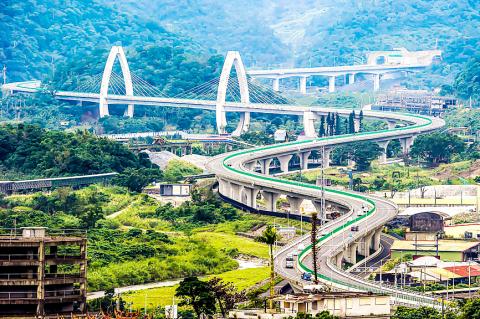The final two sections of the 38.8km project to improve the Suhua Highway are to open at 4pm on Jan. 6, the Directorate-General of Highways said on Friday.
The project covers three sections along Taiwan’s rugged east coast — from Suao (蘇澳) to Dongao (東澳) townships in Yilan County; from Nanao Township (南澳) in Yilan to Heping Township (和平) in Hualien County; and from Hejhong (和中) to Dacingshuei (大清水) in Hualien.
The first stretch opened on Feb. 5 last year, while the other two sections would start operation in time to ease holiday traffic around the Lunar New Year period from Jan. 23 to Jan. 29, according to the agency.

Photo provided by Yilan County Government
The opening of the new sections would cut travel time from two-and-a-half hours to 80 minutes, the agency said.
In the first three months of operation for the two new sections, only cars and buses would be allowed, it said, adding that trucks would be permitted following an evaluation.
As with the old Suhua Highway, the new sections and tunnels would have a single lane in each direction, with a speed limit between 40 and 60kph.
Major intercity bus operators have announced that there will be a bus service between Greater Taipei and Hualien once the new sections are opened with tickets priced at NT$300 to NT$350.
The highway, which connects Yilan and Hualien counties, includes many winding sections along cliffs overlooking the Pacific Ocean that are accident-prone and vulnerable to landslides, resulting in frequent shutdowns.
The three sections of the project bypass the most precarious parts of the old highway, mostly through the use of tunnels that would account for more than 60 percent of the new road. The longest is a 7.9km tunnel in the middle section near the Guanyin area.
The final two segments comprise 29.1km of road, 20.7km of which run through five tunnels.
The need for an upgrade gained urgency in 2010, when Typhoon Megi triggered landslides on the road, killing 26 people.
The old Suhua Highway, with its views of Taiwan’s eastern coastline, would remain open to motorists with speed limits of 40 to 50kph.

US President Donald Trump said "it’s up to" Chinese President Xi Jinping (習近平) what China does on Taiwan, but that he would be "very unhappy" with a change in the "status quo," the New York Times said in an interview published yesterday. Xi "considers it to be a part of China, and that’s up to him what he’s going to be doing," Trump told the newspaper on Wednesday. "But I’ve expressed to him that I would be very unhappy if he did that, and I don’t think he’ll do that," he added. "I hope he doesn’t do that." Trump made the comments in

Tourism in Kenting fell to a historic low for the second consecutive year last year, impacting hotels and other local businesses that rely on a steady stream of domestic tourists, the latest data showed. A total of 2.139 million tourists visited Kenting last year, down slightly from 2.14 million in 2024, the data showed. The number of tourists who visited the national park on the Hengchun Peninsula peaked in 2015 at 8.37 million people. That number has been below 2.2 million for two years, although there was a spike in October last year due to multiple long weekends. The occupancy rate for hotels

A cold surge advisory was today issued for 18 cities and counties across Taiwan, with temperatures of below 10°C forecast during the day and into tonight, the Central Weather Administration (CWA) said. New Taipei City, Taipei, Taoyuan and Hsinchu, Miaoli and Yilan counties are expected to experience sustained temperatures of 10°C or lower, the CWA said. Temperatures are likely to temporarily drop below 10°C in most other areas, except Taitung, Pingtung, Penghu and Lienchiang (Matsu) counties, CWA data showed. The cold weather is being caused by a strong continental cold air mass, combined with radiative cooling, a process in which heat escapes from

Snow this morning fell on Alishan for the first time in seven years, as a strong continental cold air mass sent temperatures plunging across Taiwan, the Central Weather Administration (CWA) said. The Alishan weather station, located at an elevation of about 2,200m in central Taiwan, recorded snowfall from 8:55am to 9:15am, when the temperature dropped to about 1°C, the CWA said. With increased moisture and low temperatures in the high-altitude Alishan area, the conditions were favorable for snow, CWA forecaster Tsai Yi-chi (蔡伊其) said. The last time snow fell at the Alishan weather station was on Jan. 10, 2018, while graupel fell there